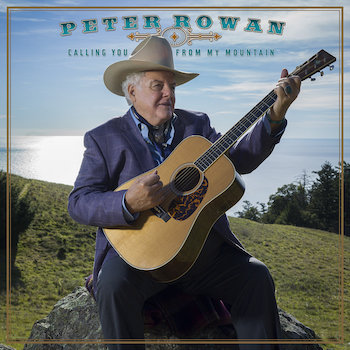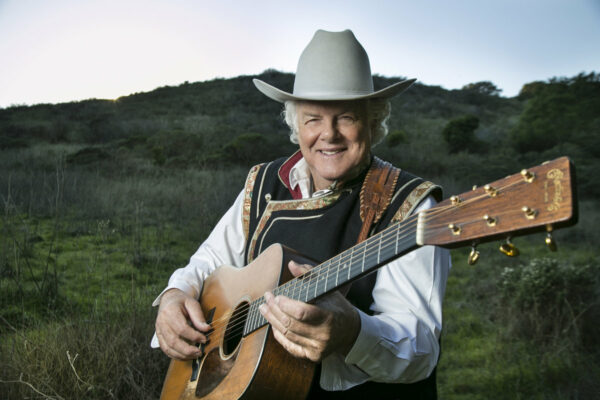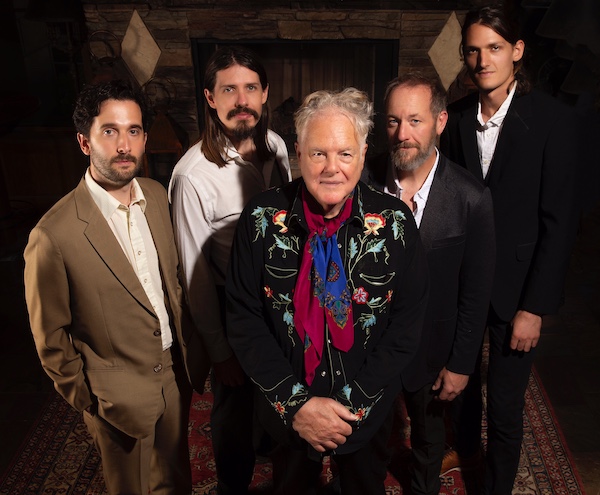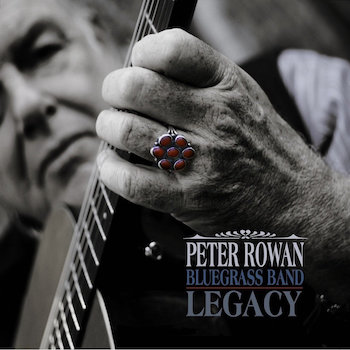Country Music Feature: Talking with Legendary Singer/Songwriter Peter Rowan
By Scott McLennan
Peter Rowan’s far-reaching view of bluegrass is inspired by his deft intertwining of music and spirituality.

Peter Rowan talks the way he plays music. Ideas ebb and flow, a bright intellect and open-hearted generosity fuel the conversation. You may choose a starting point, but your final destination is apt to be someplace you did not expect to arrive.
For example, catching up with Rowan by phone as he traveled by van with his band to a gig in Washington state, the topic of “A Winning Hand” came up.
“A Winning Hand” is one of the outstanding tracks on Rowan’s most recent album, Calling You From My Mountain, recorded with his bluegrass band and released last year. I asked about the song’s history — it was written in the ’90s but not recorded until just last year — but what emerged were observations about Nashville’s “moral confusion,” despite the fact it is a “heavily Christian town.” For Rowan, musicians ultimately pay too high a price working in that environment.
We never got to the bottom of what kept “A Winning Hand” more or less concealed until last year, but I sure got a healthy dose of Rowanology.
Rowan brings his stellar five-piece bluegrass band to the Narrows Center for the Arts in Fall River on August 17. (After that gig, he and his group will be at the Green Mountain Bluegrass Festival in Manchester Center, VT, on August 18 and at the Stone Mountain Arts Center in Brownfield, ME, on August 19.)
Expect a playful musical expedition rooted in bluegrass but open to roaming a landscape shaped by Rowan’s 60-plus years of musical inquisitiveness.
The Massachusetts native is now 81 and resides in the San Francisco area. Over the decades he has blazed a remarkable trail as a songwriter, singer, guitarist, and player of other stringed instruments.What’s more, he continues to produce new work that is as inspired and provocative as anything else you’ll find in his catalog. That impressive career includes a stint in the early ’60s with Bill Monroe, the father of bluegrass; participation in various hippie takeovers of bluegrass — most notably via the early -’70s supergroup Old & In the Way; and assorted forays into country, blues, and even reggae. Rowan has penned countless songs that have worked their way into the great campfire songbook, among them “Land of the Navajo,” “Midnight Moonlight,” “Angel Island” and “Dustbowl Children.”
In other words, Rowan is the kind of artist for which the broad term “Americana” was invented.
Interest in Rowan, along with a general boost in popularity for bluegrass, has been spiking lately, thanks to the rise of young artists such as Molly Tuttle, Billy Strings, Lindsay Lou, Michael Cleveland, and others who are drawing in young audiences anxious to hear a traditional sound. And, just like Rowan did after he split from Monroe’s Bluegrass Boys, these players are putting their own spin on the high lonesome sound. Strings, Tuttle, and Lindsay Lou make guest appearances on Calling You From My Mountain. It was clear that Rowan is smitten with them as individual talents as well as what they contributed to his album. “They are playing traditional music and jamming in their own style,” he said.

Peter Rowan — the kind of artist for which the broad term “Americana” was invented. Photo: Amanda Rowan
What is happening with bluegrass today mirrors Rowan’s own experiences when he moved on from Monroe’s Bluegrass Boys and worked in such bands as Earth Opera and Seatrain. “It was a given that there was so much going on in music and [that was] influencing how we thought about music, “he said.” You had free jazz. You had the Country Gentlemen playing Bob Dylan songs.”
Rowan still enjoys the tradition of breaking tradition, speaking highly of Tuttle’s cover of the Rolling Stones “She’s a Rainbow” as a good example of that kind of rethinking.
Rowan’s far-reaching view of bluegrass is inspired by his deft intertwining of music and spirituality. He moves lithely across traditions — Eastern, Western, Native American, humanist, you name it — sprinkling these spiritual motifs into his songs.
And his sociopolitical worldview is also free of rigid boundaries. The new album, for instance, features “The Red, The White, and The Blue,” which draws a sharp distinction between meaningful patriotism and military madness. And the moving “Freedom Trilogy,” which closes the new album, is a complex meditation on freedom. It is not a childish array of platitudes.
Rowan credits his interest in the spiritual to his time spent growing up in Massachusetts, where the ideas stemming from New England transcendentalism were in the air. Lessons on the intertwining of death and rebirth were dramatically present during his walks in the woods. It also helped that a psychedelic folk music scene was blossoming around Boston.

Peter Rowan and band. Photo: Tim Benko
As a young songwriter and musician, Rowan was first drawn to the blues, transfixed by its language of suffering. In bluegrass, Rowan said, the artists connected suffering with mortality and the promise of immortality. “There was a big resurgence for Muddy Waters, Lightnin’ Hopkins, and other blues musicians,” he explained. “Then I heard Bill Monroe’s version of Leadbelly’s ‘In the Pines.’ That’s when I sensed that the language of suffering, in bluegrass, is more about death and its aftermath. In a lot of the Stanley Brothers songs, they talk about life beyond dying and the human soul. A walk in the woods brings it all to mind.”
The idea of rebirth takes on additional resonance for an artist whose most recent album was a response to a global pandemic.
As for future recordings, Rowan is keen on making an album based on his fascination with Hank Williams’s “Luke the Drifter” material. In the early ’50s, at the height of his popularity, Williams recorded talking-blues spirituals that were so different from his hits of the time that the country star felt the need to adopt a separate persona to record them.
 But before Rowan could really dig into that project, he started playing live again with his bluegrass band — Chris Henry on mandolin, Max Wareham on banjo, Julian Pinelli on fiddle, and Eric Thorin on acoustic bass –and he felt they needed to record as soon as possible. “I just needed to jump back into it,” Rowan said. The result was Calling You From My Mountain.
But before Rowan could really dig into that project, he started playing live again with his bluegrass band — Chris Henry on mandolin, Max Wareham on banjo, Julian Pinelli on fiddle, and Eric Thorin on acoustic bass –and he felt they needed to record as soon as possible. “I just needed to jump back into it,” Rowan said. The result was Calling You From My Mountain.
In concert, Rowan’s bluegrass band has been performing songs from throughout his career, reaching back to “Walls of Time,” written with Bill Monroe. He also is performing one of the all-time weed classics “Panama Red.” The guitarist said that recent additions to the band’s live repertoire include “Thirsty in the Rain” from the early ’80s and the haunting composition “Mississippi Moon,” a song his Old & In the Way bandmate Jerry Garcia recorded for a solo album.
Rowan said that returning to the “Luke the Drifter” project is likely to be his next move. He has already cut the song “Dream of Heaven,” which was written for that project. It is included on Calling You From My Mountain.
Of course, that “next move” is subject to change.
Scott McLennan covered music for the Worcester Telegram & Gazette from 1993 to 2008. He then contributed music reviews and features to the Boston Globe, Providence Journal, Portland Press Herald, and WGBH, as well as to the Arts Fuse. He also operated the NE Metal blog to provide in-depth coverage of the region’s heavy metal scene.
